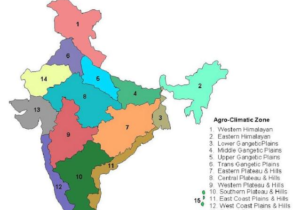Despite their flaws in limiting access to larger markets and poor price realization for agricultural produce, APMCs have their utility. Analyse the statement and suggest reforms in agriculture marketing in the country
Approach:
- Introduce the answer defining the APMCs.
- In the body of the answer, discuss various utilities of APMC.
- In the next part of the body, discuss the reasons as to why the APMCs have failed in serving their mandate.
- In the last part of the body, suggest measures for reforming agricultural marketing in the country.
- Conclude the answer by emphasizing upon the need to comprehensively overhaul the APMCs.
Agricultural Produce Market Committee (APMC) is a marketing board established by state governments. Though the APMCs are criticised for limiting free trade in agricultural commodities, they have vital utility as:
- APMCs provide as a platform for price discovery and give farmers a designated location to sell their goods.
- APMCs offer the necessary infrastructure for farm products to be weighed, graded, etc., assisting in their standardisation.
- APMCs offer a non-official channel of communication between farmers and arahtiyas, which, in the lack of institutional support, helps farmers under pressure.
- The market committees at the APMCs are crucial to the state’s acquisition of agricultural products at MSPs.
- APMCs offer a wide range of crucial ancillary services to farmers, including post offices, canteens, drinking water, laboratories for soil testing, and warehouses.
Despite their benefits, it is argued that the APMCs have failed to serve their purpose because:
- There are restrictions on the free trade of agricultural commodities as a result of the APMCs’ monopoly.
- Due to the creation of cartels, APMCs add a large number of middlemen between producers and consumers, restricting the price that farmers may realise.
- APMCs impose expensive charges on farmers without offering adequate services in return. For instance, food is wasted because there are no cold storage or warehouse facilities.
- There aren’t enough APMCs, especially in the hills and hinterlands, to ensure that farmers can reach them quickly and easily.
- APMCs work as both a market and a regulatory body, creating difficulties for contract farming and free trade.
In light of the aforementioned challenges there is a need to bring reforms in the agricultural marketing:
- As the country has glided over the issues of food security there is a need to review the utility of the Essential Commodities act.
- Inter-state and intra-state trade outside APMCs should be facilitated to ensure better price realisation.
- Model farming contract law should be implemented by the states in order to encourage direct partnership between the corporations and the farmers.
- APMC reforms are an urgent imperative:
- Infrastructure in the APMCs for grading, sorting, storage etc., should be improved.
- Cartelization and monopolisation should be checked.
- Number of APMCs should be increased.
- e-NAM framework should be integrated with APMCs to effect better price discovery.
- Decentralised procurement from the farm gate should be promoted to prevent post-harvest losses. Eg: GrAMs are a step in the right direction.
APMCs are a vital cog in the wheel of agricultural marketing. However, there is a need for a comprehensive overhaul, in order to make them more effective, relevant and farmer-friendly









